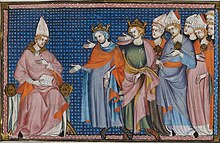Martin IV.

Martin IV. (* Around 1210 in Mainpincia ( France ); † March 28, 1285 in Perugia ) was Pope from 1281 until his death .
Life
Born as Simon de Brion, Martin IV, whose origins and early years there are little sources of information, first appeared as archdeacon in Rouen and as canon in Tours . In 1260 he became Chancellor of the French King Louis IX.
Raised cardinal priest of the titular church of Santa Cecilia in 1261 , Simon de Brion was repeatedly active as papal legate at the French court . He was also head of the Inquisition from 1262 .
After the death of Pope Nicholas III. (1280) the cardinals called to elect a successor met for the conclave in Viterbo . In order to strengthen the power of the French cardinals, Cardinal Matteo Orsini, a relative of the deceased Pope, was arrested as a precaution. After a six-month conclave marked by conflicts of power politics, Simon de Brion was elected Pope on February 22, 1281 at the pressure of Charles I of Naples-Sicily .
His choice of name is based on a mix-up of the papal names Martin and Marinus in medieval sources. Marinus I and Marinus II were often mistakenly named Martin II and Martin III. been made so that Simon his pontificate as Martin IV. took, his immediate predecessor although names Pope Martin I had been.
This Pope, widely perceived as weak, took every one of his actions - whether secular or political - as a French and not as a Pope. He was little more than the compliant court chaplain to King Charles I of Naples-Sicily. The Pope reappointed Charles I as Senator of Rome . This made him the actual ruler of the Papal States. The goal of Charles was still the conquest of Byzantium. He compelled the Pope to banish the Byzantine Emperor Michael VIII (November 18, 1282). The Sicilian Vespers on March 31, 1282, supported by Byzantium and triggered by the bloody rule of the hated French, saved the Eastern Roman-Byzantine Empire from the plans to conquer the Anjou. In Sicily came on September 4, 1282 Peter III. of Aragon , a son-in-law of King Manfred to power. As a reaction of the Pope, the ban and deposition of Peter III followed. (March 21, 1283) and the appointment of Charles of Valois , son of Philip III. , ruler of Aragon on May 5, 1284 . This papal measure had no consequences. The subsequent French war of aggression, waged primarily out of dynastic interests and yet declared a crusade by the Pope, ended with the total defeat of the French fleet. Half a year before Charles I's death on January 7, 1285, his heir to the throne, Charles , was captured by an Aragonese fleet on June 5, 1284.
He broke off the negotiations that his predecessor had started with the German King Rudolf I of Habsburg about an imperial coronation. In Italy, too, he never managed to gain influence. After his election, the city of Rome refused to allow him to move in, which is why he moved his official residence to Orvieto .
Significant for church history is the extensive recognition and strengthening of the mendicant orders going back to Martin IV .
He died in Perugia and was buried in the local cathedral .
Martin IV is mentioned in the Twenty-fourth Canto of Purgatory of Dante Alighieri's Divine Comedy , where he is ascribed a penchant for eating eels.
See also
literature
- Simonetta Cerrini: MARTINO IV, papa. In: Mario Caravale (ed.): Dizionario Biografico degli Italiani (DBI). Volume 71: Marsilli – Massimino da Salerno. Istituto della Enciclopedia Italiana, Rome 2008.
- Simonetta Cerrini: MARTINO IV. In: Massimo Bray (ed.): Enciclopedia dei Papi. Volume 2: Niccolò I, santo, Sisto IV. Istituto della Enciclopedia Italiana, Rome 2000 ( treccani.it ).
- Michael Ott: Pope Martin IV . In: Catholic Encyclopedia , Volume 9, Robert Appleton Company, New York 1910.
- Burkhard Roberg: Martin IV., Pope (1281-1285) . In: Lexicon of the Middle Ages (LexMA). Volume 6, Artemis & Winkler, Munich / Zurich 1993, ISBN 3-7608-8906-9 , column 341 f.
- Klaus-Gunther Wesseling : Martin IV. In: Biographisch-Bibliographisches Kirchenlexikon (BBKL). Volume 5, Bautz, Herzberg 1993, ISBN 3-88309-043-3 , Sp. 910-912.
Web links
- Literature by and about Martin IV. In the catalog of the German National Library
Notes and individual references
- ^ Dante Alighieri: Divine Comedy , Das Pegefeuer , Twenty-Fourth Song, pp. 330 - 331 in the translation by Carl Streckfuß , edition of 1876
- ↑ Thomas Migge: Pleasure and Gluttony: Eating like the Popes in Rome , contribution from September 11, 2015 in the series Tag für Tag des Deutschlandfunk
| predecessor | Office | successor |
|---|---|---|
| Nicholas III |
Pope 1281-1285 |
Honorius IV. |
| personal data | |
|---|---|
| SURNAME | Martin IV. |
| ALTERNATIVE NAMES | Simon de Brion |
| BRIEF DESCRIPTION | Pope (1281-1285) |
| DATE OF BIRTH | around 1210 |
| PLACE OF BIRTH | Mainpincien , France |
| DATE OF DEATH | March 28, 1285 |
| Place of death | Perugia , Papal States |